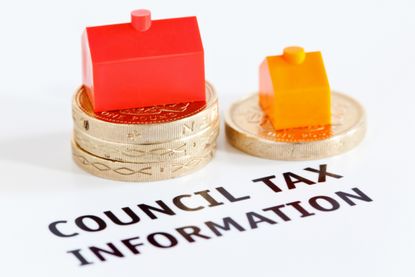How your council tax is calculated: everything you need to know
Households may have to pay more council tax after the Chancellor announced changes to rules in the Autumn Statement. Plus, we explain everything you need to know about how your council tax is calculated


Local authorities can increase council tax by a maximum of 5% a year from April 2023 without a referendum - 3% for all local authorities and an additional 2% for those that have social care responsibilities. This is up from 2.99%.
Council tax helps fund a long list of local services like bin collections, police and fire services, support for the elderly, street cleaning and looking after parks and cemeteries.
Over £32billion was collected in council tax last year by local authorities across England, and with bills possibly rising again, we explain everything you need to know.
How is council tax calculated?
How much you pay in council tax depends on two things: your property’s council tax banding, and how much money your local authority needs for public services.
You can use our 2022-23 council tax calculator to find out how much local authorities are charging for each council tax band. Simply choose your location via the dropdown menus.
The rule is that the higher the value of your property, the more you pay in council tax. In England and Scotland, Band A is the lowest band rating and incurs the lowest rate of council tax, while at the other end of the scale, Band H means residents pay the highest council tax bills.
Council tax bills are based on Band D which is used as the standard measure of council tax. Households in Band D pay an average of £1,966 a year (in 2022-23), and for households in bands either side of this, council tax bills are then either reduced on a sliding scale down to Band A, or increased upwards on a sliding scale up to Band H.
Look After My Bills Newsletter
Get the best money-saving tips, tricks and deals sent straight to your inbox every week. Make sense of your money in partnership with The Money Edit.
As council tax could now rise by 5% due to changes announced in the Autumn Statament, this figure could increase to around £2,064 in 2023-24.
Payments can be made in ten monthly instalments, with a payment break in February and March the following year. You can arrange to pay in twelve monthly payments, (at no extra cost), if you contact your local council.
How much is my council tax?
If you don’t have your bill to hand, and you need to check which council tax band you’re on, there are other ways to check.
You can do this using the postcode checker on the Government website for properties in England and Wales and on the Scottish Assessors website for properties in Scotland. In Northern Ireland, there’s a system of rates, rather than council tax.
You can also find the annual council tax charged by any local authority using the Which? postcode checker.
Council tax bills for properties in the same band will vary across different authorities, depending on the area and services provided. For example, a Band A property in Boston, Lincolnshire means a council tax bill of £1,325, compared with £1,406 in Cornwall.
At the other end of the scale, a Band H property in Boston means an annual bill of £3,975 compared with £4,218 in Cornwall.
Can the council raise council tax?
Local authorities can put up council tax bills each year, however they can’t charge what they like, without further consultation.
During the Autumn Statement on 17 November, the Chancellor gave the green light for councils to increase council tax bills by up to 5% for the 2023/2024 year.
For example, Bristol City Council currently charges just over £2,230 for Band D households. But with a 3% rise, households could be paying over £67 more a year - paying £2,296 in total. And with a 5% rise, households could be paying around £111 more a year - paying £2,341 in total.
If they want to charge more, this needs to be agreed by a local referendum, according to the Local Government Association.
How can I reduce the amount of council tax I’m paying?
You may be able to get a reduction on your council tax bill in certain circumstances, for example if you live alone, you can qualify for a 25% discount.
And if you’re selling a property after someone’s who died, there’s no council tax liability until after Probate, providing the property remains empty.
Households in England and Scotland will also get a £150 non-repayable council tax rebate this April as part of a financial support package to ease the burden of rising costs.

Sue Hayward is a personal finance and consumer journalist, broadcaster and author who regularly chats on TV and Radio on ways to get more power for your pound. Sue’s written for a wide range of publications including the Guardian, i Paper, Good Housekeeping, Lovemoney and My Weekly. Cats, cheese and travel are Sue’s passions away from her desk!
-
 Three energy firms pay £8m in switching compensation - has your provider paid out?
Three energy firms pay £8m in switching compensation - has your provider paid out?More than 100,000 customers have received compensation after changing providers, but is now a good time to switch energy suppliers?
By Tom Higgins Published
-
 Save £300 on your supermarket shop with cashback accounts
Save £300 on your supermarket shop with cashback accountsBanks, credit card companies and cashback sites are all offering cashback on your supermarket shop, but can you use them all to max out your savings?
By Vaishali Varu Published
-
 Three energy firms pay £8m in switching compensation - has your provider paid out?
Three energy firms pay £8m in switching compensation - has your provider paid out?More than 100,000 customers have received compensation after changing providers, but is now a good time to switch energy suppliers?
By Tom Higgins Published
-
 HMRC tax credit renewal packs: act quickly to avoid losing benefit payments
HMRC tax credit renewal packs: act quickly to avoid losing benefit paymentsHouseholds receiving tax credits will be asked to confirm their details to ensure they continue to receive their entitlement. Here’s everything you need to know to make sure you don’t miss out on up to £3,480 a year
By Tom Higgins Published
-
 Mobile provider rewards: how to earn up to £700
Mobile provider rewards: how to earn up to £700Your phone could be the key to unlocking hundreds of pounds worth of discounts and freebies that you don’t even know about. We reveal which mobile providers offer the best rewards
By Vaishali Varu Published
-
 How much do cooking appliances cost to run?
How much do cooking appliances cost to run?Energy-saving cooking tips from the Energy Saving Trust
By Katie Binns Published
-
 Virgin Media leaves thousands without broadband: are customers entitled to compensation?
Virgin Media leaves thousands without broadband: are customers entitled to compensation?Tens of thousands of Virgin Media customers were hit by broadband outages yesterday. We explain your rights if your broadband goes down
By Katie Binns Published
-
 Broadband switching service delayed - how it will eventually work and why it’s crucial to switch
Broadband switching service delayed - how it will eventually work and why it’s crucial to switchA broadband switching service designed to make it easier to change to a cheaper or faster deal has been delayed. We explain how you can still avoid huge increases to your monthly internet bill
By Katie Binns Published
-
 Heat pumps: why you can claim a £5,000 government grant for longer
Heat pumps: why you can claim a £5,000 government grant for longerWhy you now have more time to apply for a government grant towards getting a heat pump in your home
By Sue Hayward Published
-
 British Gas cuts energy bills by £15 for prepayment meter customers from April
British Gas cuts energy bills by £15 for prepayment meter customers from AprilOne million British Gas customers on energy prepayment meters will save around £15 as British Gas cuts its penalty three months early
By Sue Hayward Published